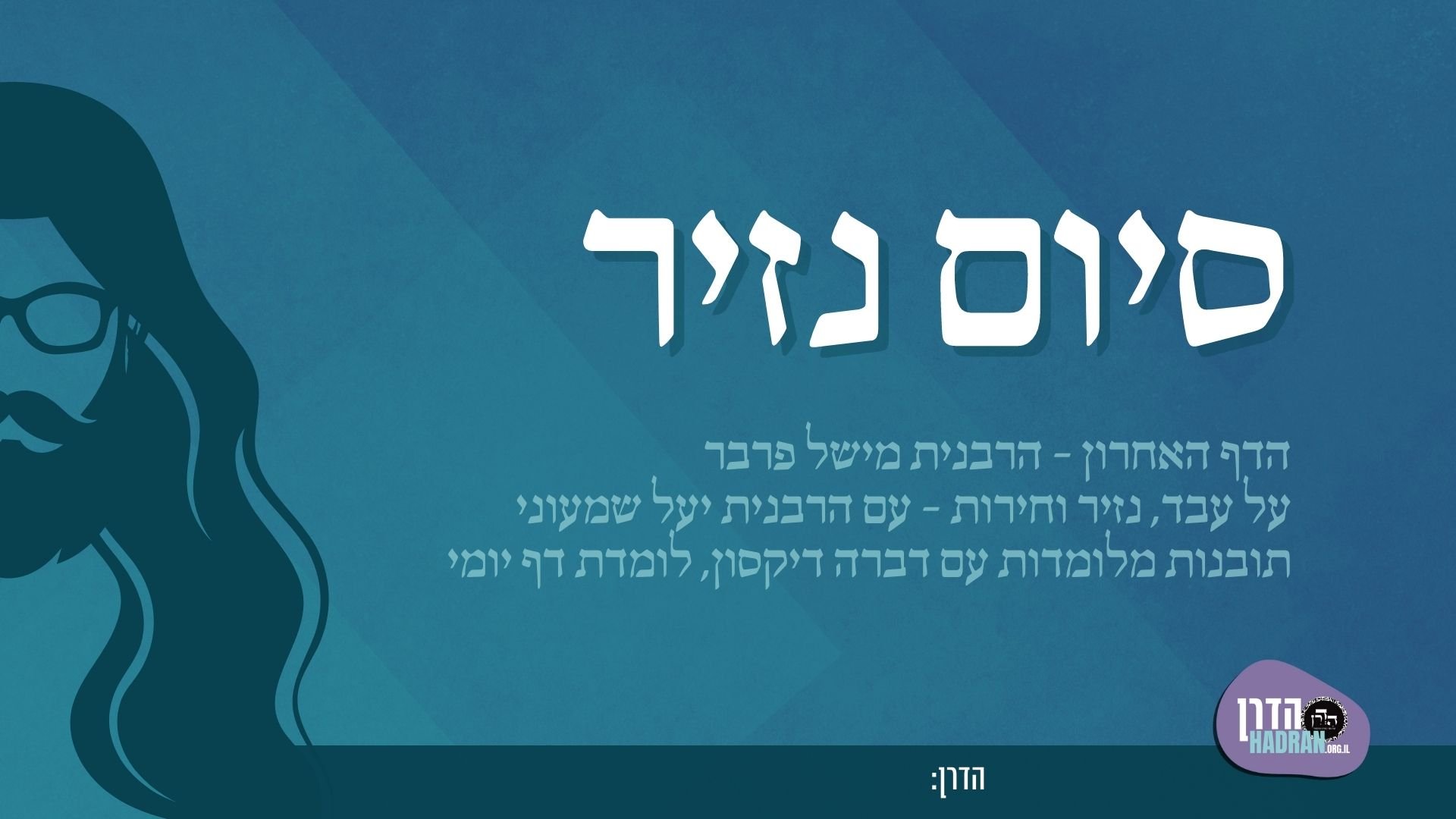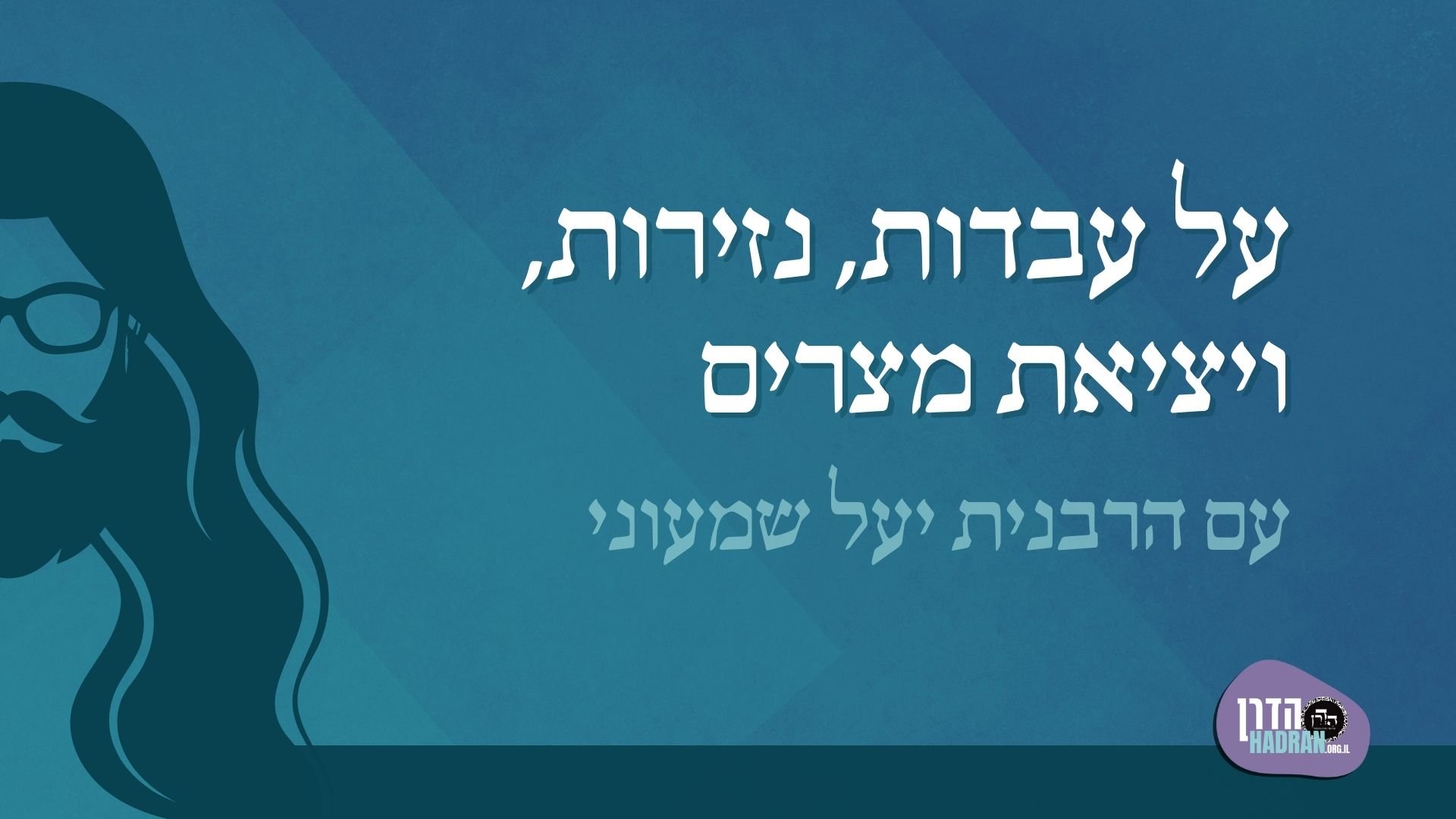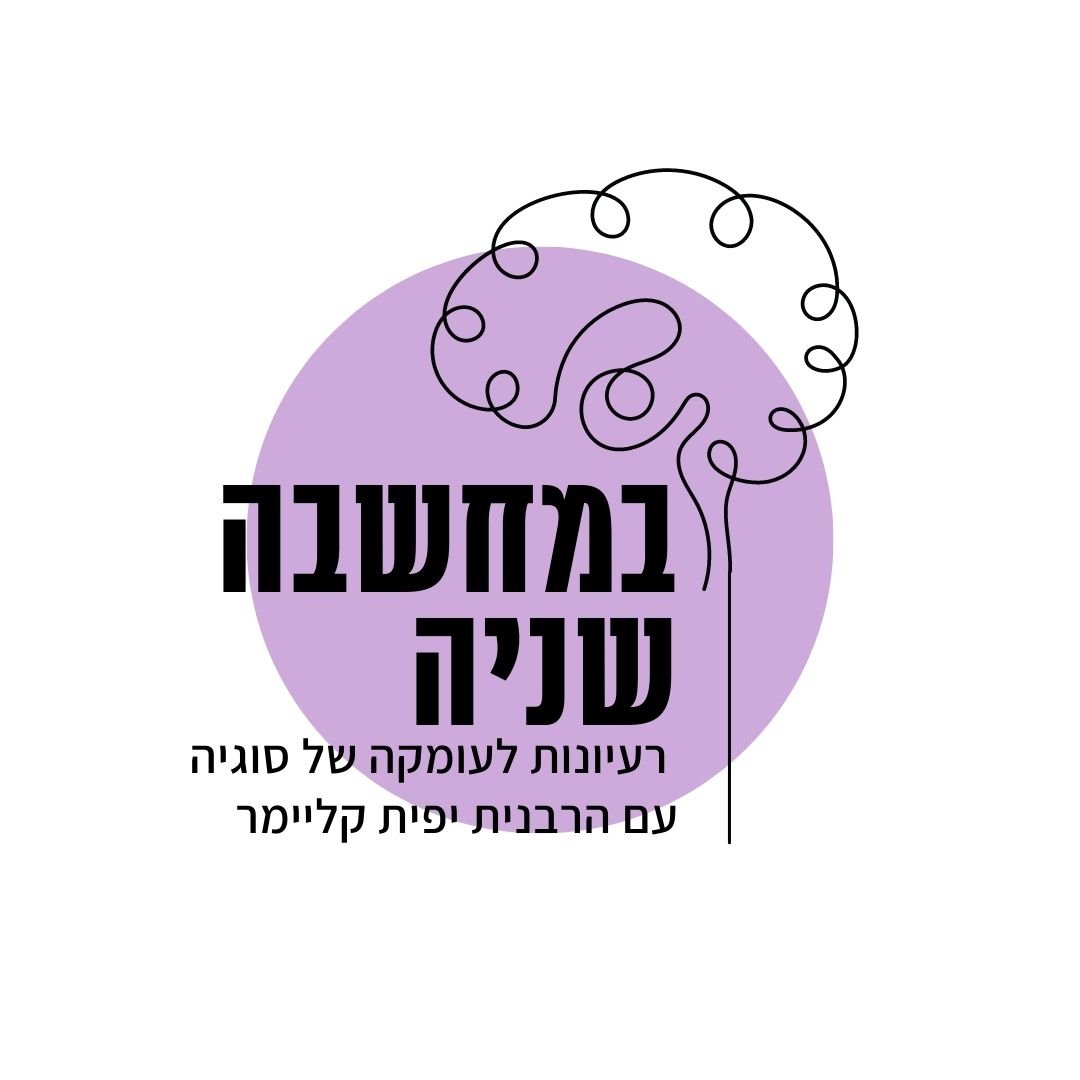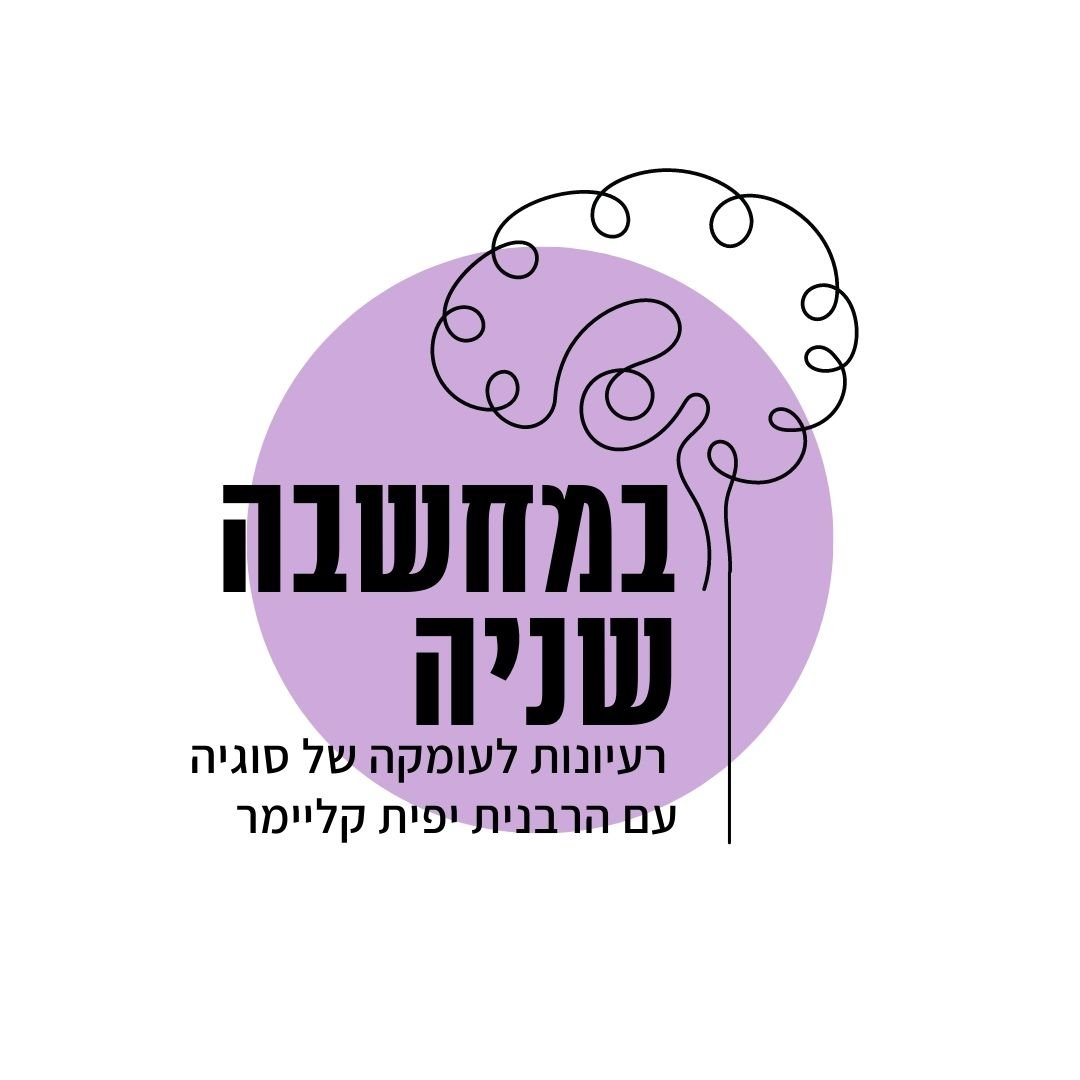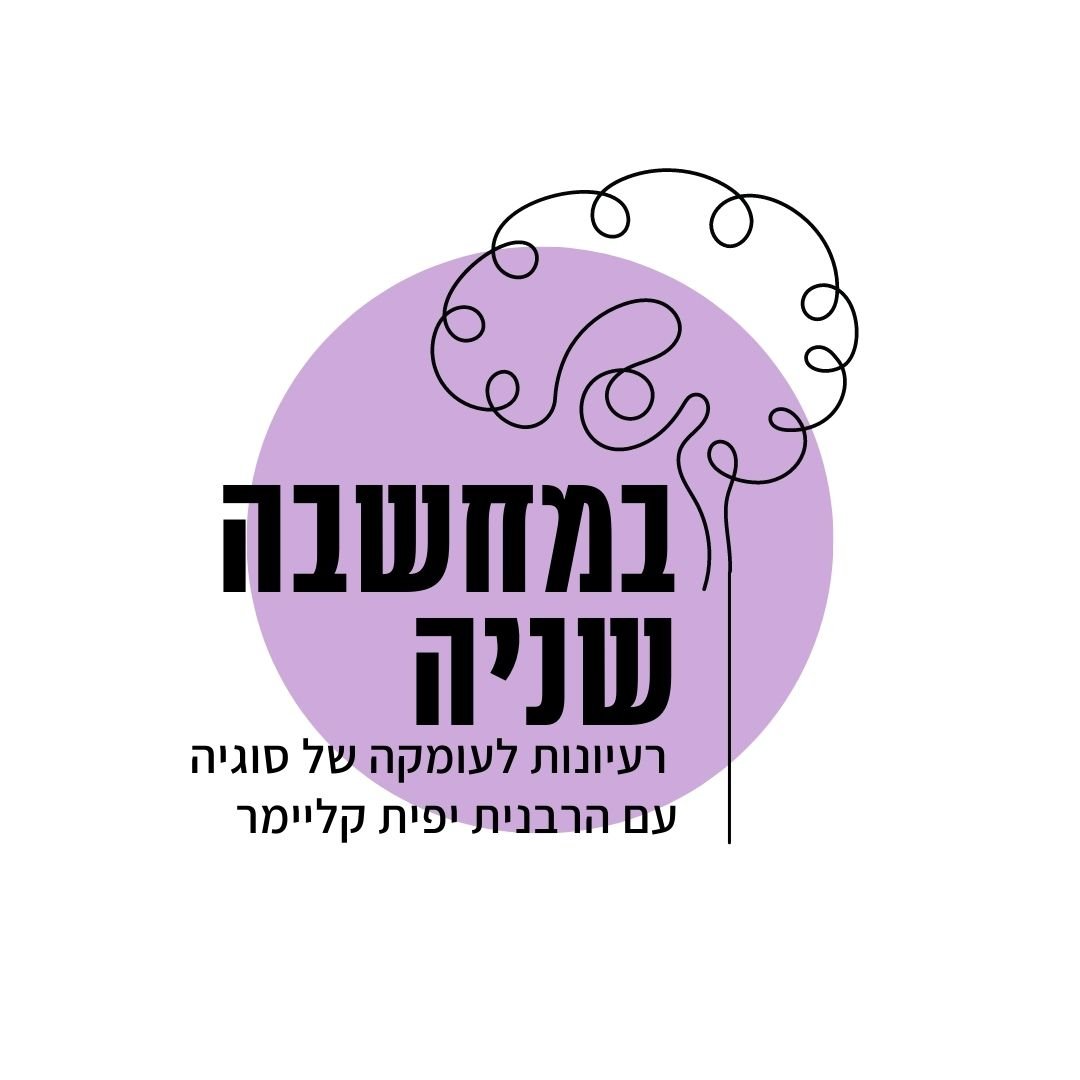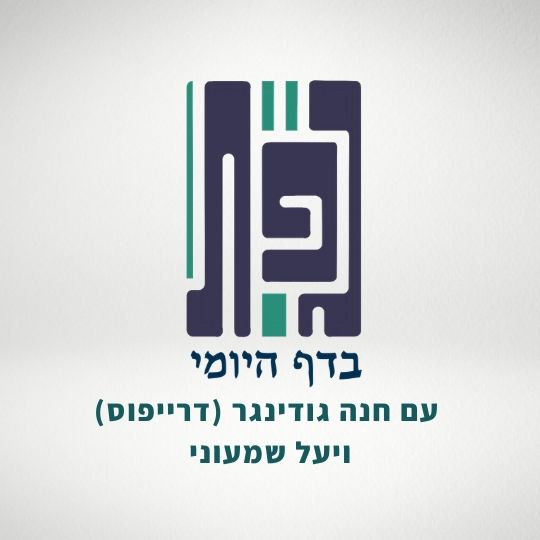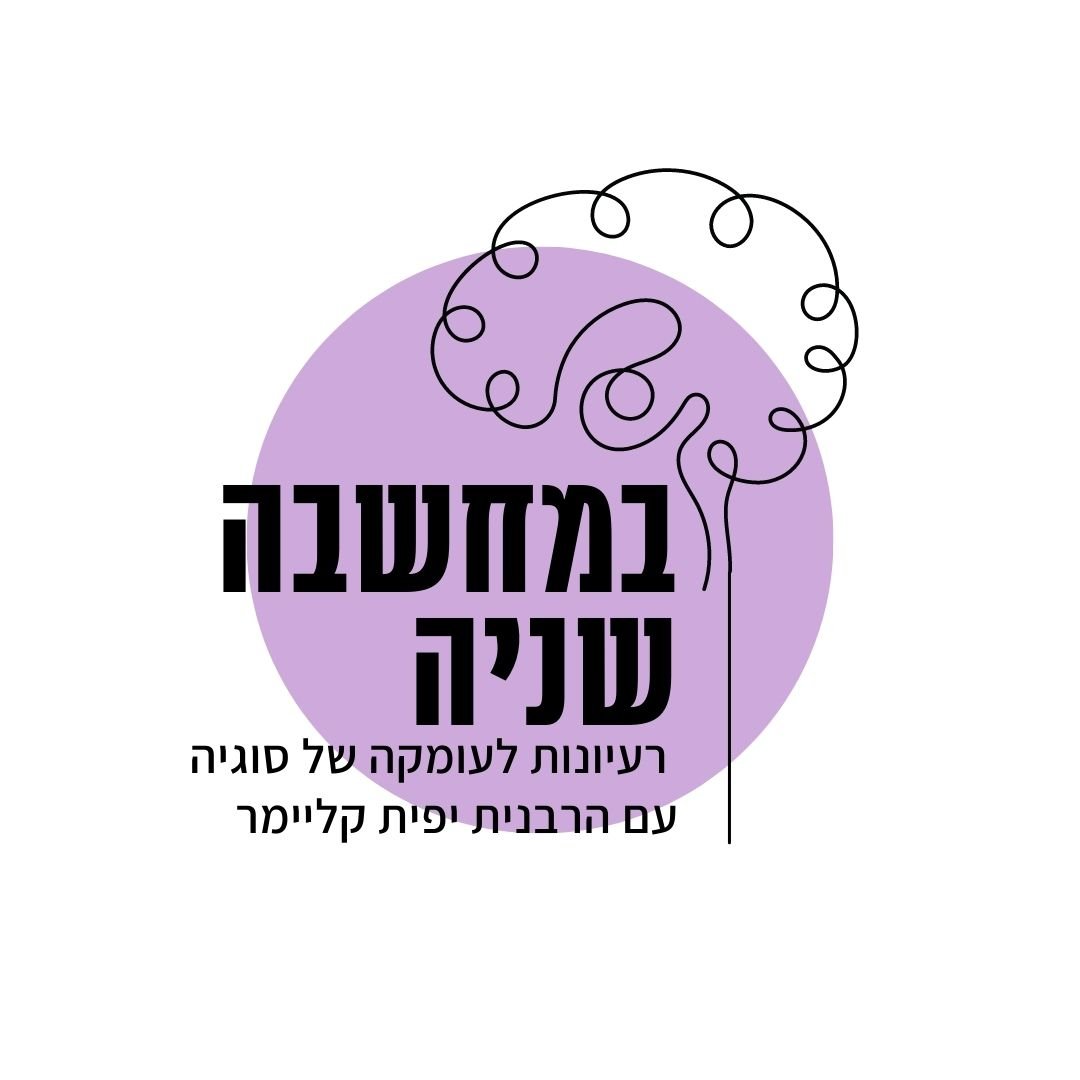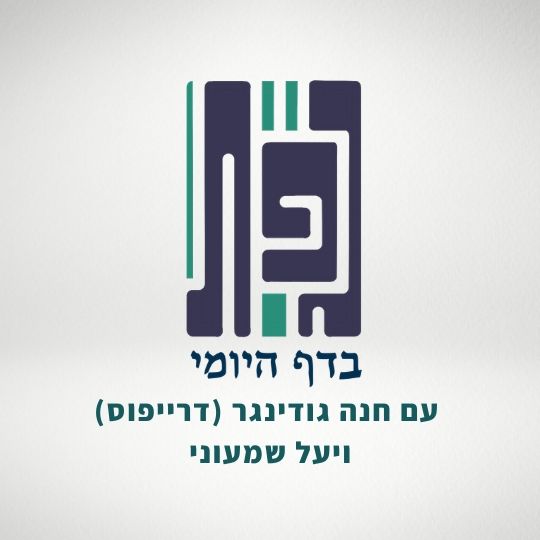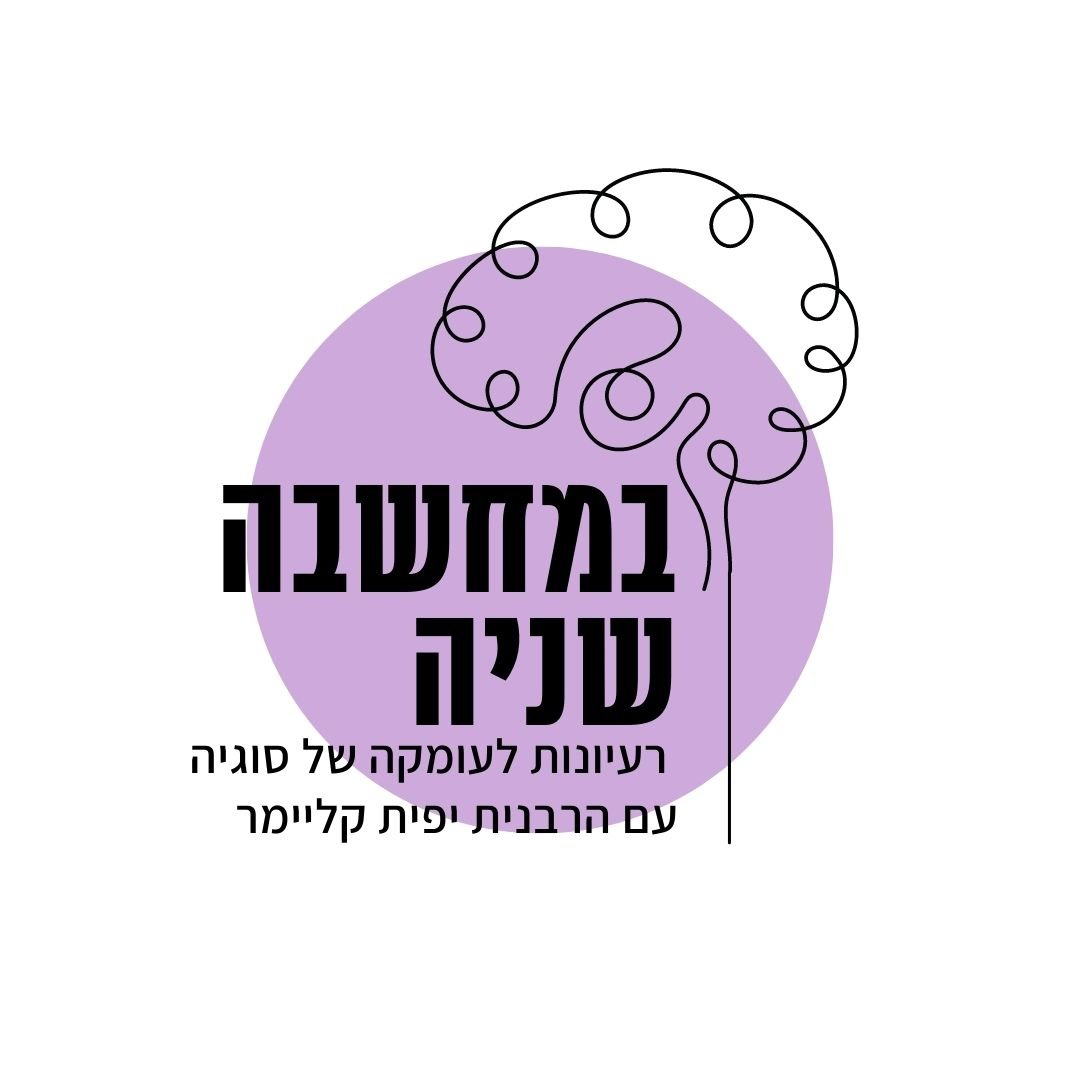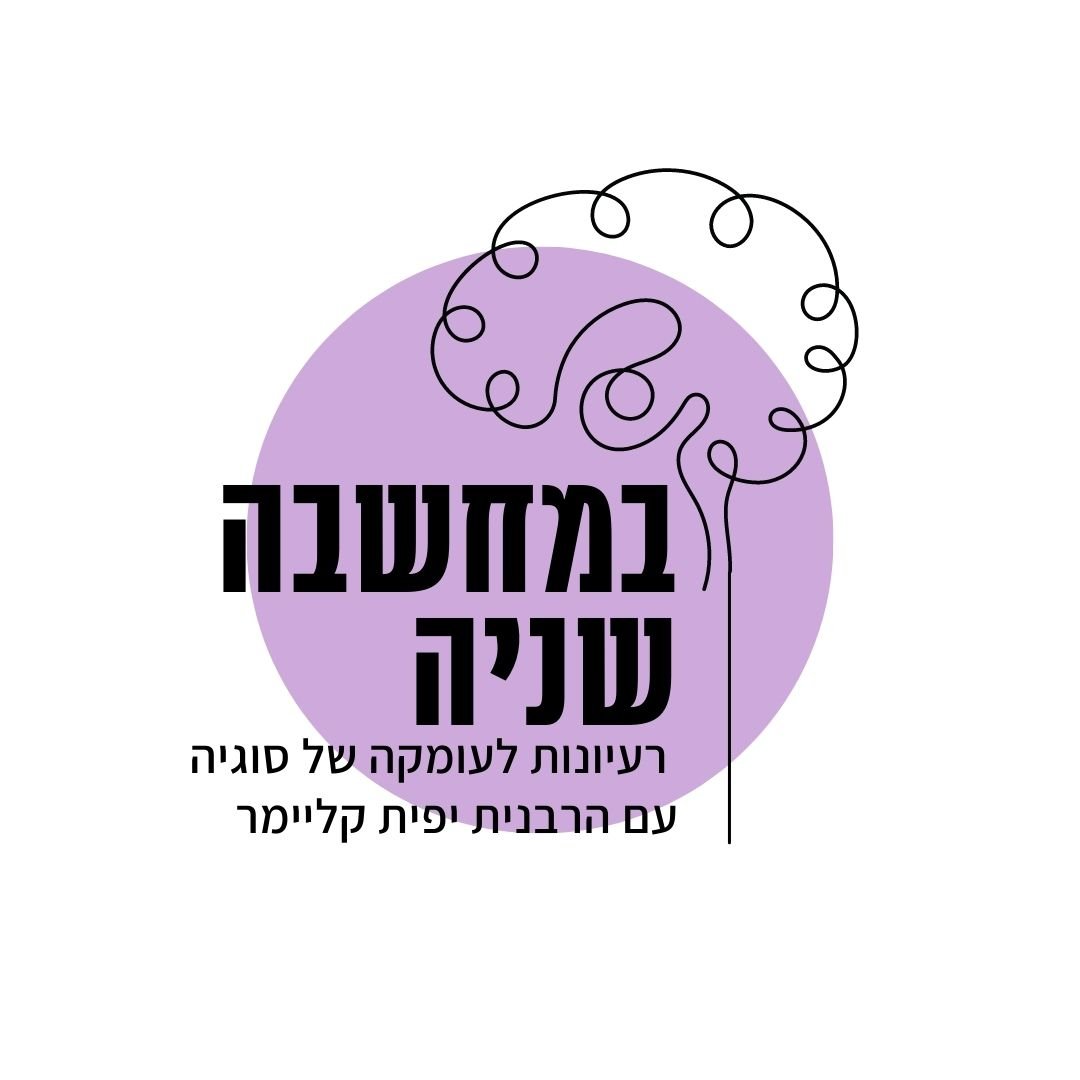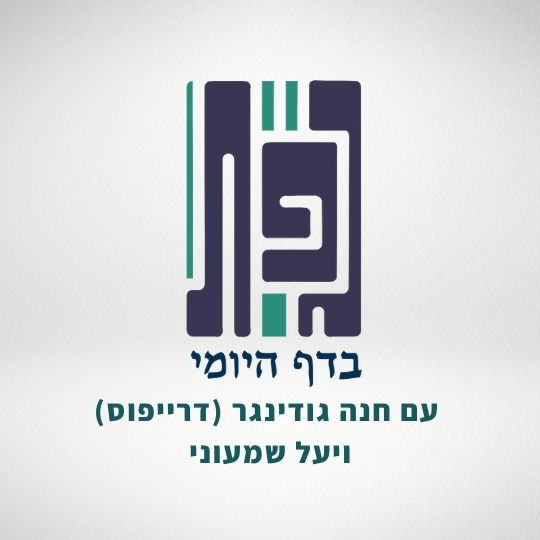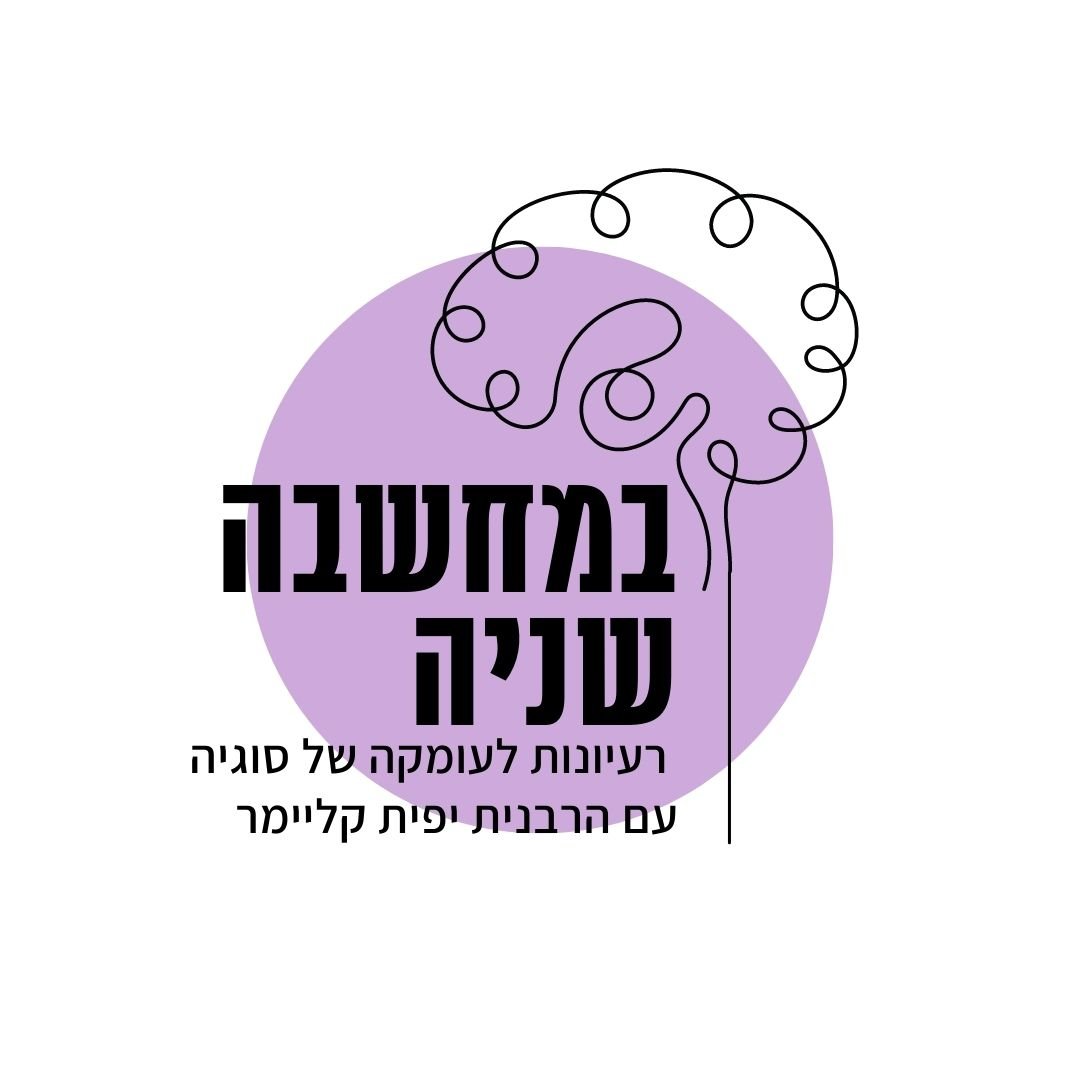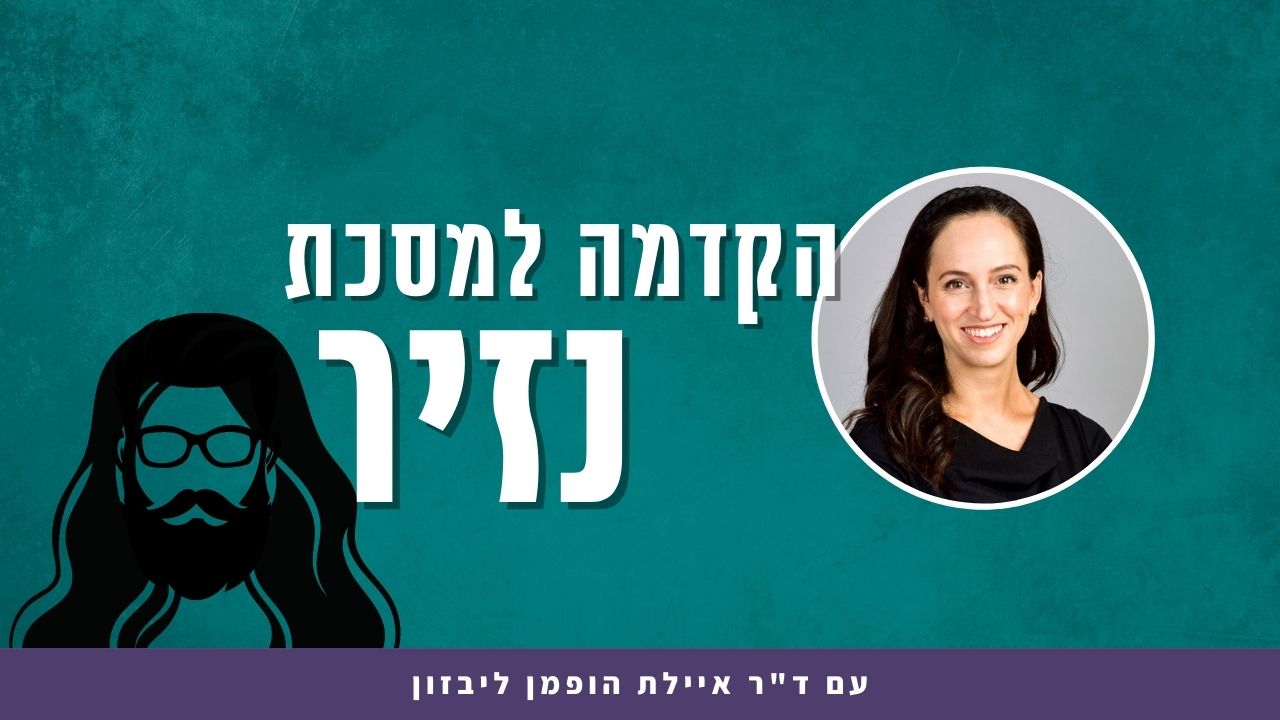אם יש ספק אם נזיר נטמא למת ונצטרע, יש להתגלח ארבע פעמים ובכל פעם להביא קרבנות ופעולות שונות. מה עושים בכל שלב ואילו תנאים צריך להגיד? מה הנוהל אם נזיר היה ודאי מצורע אבל ספק טמא למת? מה אם היה ודאי טמא וספק מצורע? מדוע אחד התגלחות לא יכול להיחשב לשני עניינים כגון נזירות טהרה וצרעת? רבי שמעון בר יוחאי מפרט את כל ההבדלים בין סוגי התגלחות השונות, ובכך מסביר מדוע אי אפשר לעשות תגלחת אחת על שני עניינים שונים.
רוצה להקדיש שיעור?
כלים
העמקה
רוצה להבין מה באמת קורה מתחת לפני השטח של הסוגיה?
שיעורים, פודקאסטים והרחבות של מיטב המורות שלנו יפתחו לך עוד זוויות וכיווני חשיבה.
חדשה בלימוד הגמרא?
זה הדף הראשון שלך? איזו התרגשות עצומה! יש לנו בדיוק את התכנים והכלים שיעזרו לך לעשות את הצעדים הראשונים ללמידה בקצב וברמה שלך, כך תוכלי להרגיש בנוח גם בתוך הסוגיות המורכבות ומאתגרות.
פסיפס הלומדות שלנו
גלי את קהילת הלומדות שלנו, מגוון נשים, רקעים וסיפורים. כולן חלק מתנועה ומסע מרגש ועוצמתי.
נזיר ס
גְּמָ׳ תָּנָא: בַּמֶּה דְּבָרִים אֲמוּרִים — בִּנְזִירוּת מוּעֶטֶת, אֲבָל בִּנְזִירוּת בַּת שָׁנָה — אוֹכֵל בְּקָדָשִׁים לְאַחַר שְׁתֵּי שָׁנִים,
GEMARA: The Sage taught: In what case is this statement of the mishna said? With regard to a short naziriteship of thirty days. However, with regard to a naziriteship of a year, he partakes of sacrificial food only after two years. He cannot shave until a year has passed, in case he is not a leper; he may shave the second time only a year later, in case he was impure during the first year and this second year was his naziriteship observed in purity. At this stage he may partake of sacrificial meat, for if he was a full-fledged leper he has shaved twice.
וְשׁוֹתֶה יַיִן וּמִיטַּמֵּא לְמֵתִים לְאַחַר אַרְבַּע שָׁנִים.
Yet if the first two shavings were for his leprosy, he has not shaved for his naziriteship at all, and therefore he must observe a third year of naziriteship and shave. He then must observe another year of naziriteship and shave again, as perhaps his third shaving was for impurity and the fourth will be for his naziriteship in purity. And consequently he may drink wine and become impure from the dead only after four years.
וְתָנֵי עֲלַהּ: וּמְגַלֵּחַ אַרְבַּע תִּגְלָחִיּוֹת. תִּגְלַחַת רִאשׁוֹנָה — מֵבִיא צִפּוֹרִים,
And it is taught with regard to the halakha of the mishna (Tosefta 6:1): And he shaves with four separate acts of shaving, each time for its own reason. How so? For his first shaving, after the thirty days of an unspecified naziriteship or at the end of the period he vowed to observe naziriteship, he brings two birds of a leper: One is slaughtered over spring water and the other is sent away (Leviticus 14:4–7).
וְחַטַּאת הָעוֹף, וְעוֹלַת בְּהֵמָה. שְׁנִיָּה — מֵבִיא חַטַּאת הָעוֹף וְעוֹלַת בְּהֵמָה, שְׁלִישִׁית — מֵבִיא חַטַּאת הָעוֹף וְעוֹלַת בְּהֵמָה, רְבִיעִית — מֵבִיא קׇרְבַּן טׇהֳרָה.
And he also brings a bird sin-offering for his shaving of impure naziriteship, as he may have contracted impurity from a corpse, and an animal burnt-offering for his shaving of purity, as he may not have contracted impurity from a corpse. For his second shaving he brings a bird sin-offering and an animal burnt-offering. For his third shaving he again brings a bird sin-offering and an animal burnt-offering. And for the fourth shaving he brings an offering of purity.
אָמַרְתָּ: תִּגְלַחַת רִאשׁוֹן מֵבִיא וְכוּ׳. מִמָּה נַפְשָׁךְ שַׁפִּיר קָמַיְיתֵי, דְּאִי וַדַּאי מְצוֹרָע הוּא וְלָאו טָמֵא הוּא — צִיפּוֹרִין חוֹבָתוֹ, וְחַטַּאת הָעוֹף סָפֵק, אָזְלָא לִקְבוּרָה, וְעוֹלָה הָוְיָא נְדָבָה.
The Gemara analyzes the details and reasons for this halakha: You said in this baraita that for the first shaving he brings the two birds of a leper, as well as a bird sin-offering and an animal burnt-offering. The Gemara explains: In this manner he brings the proper offerings whichever way you look at it. As, if his status as a leper is definite and he is not impure, the birds he brings are for his obligation to purify himself from leprosy. And as the bird sin-offering in case he was impure was brought due to uncertainty, it goes for burial, like all bird sin-offerings sacrificed in a case of uncertainty, which cannot be eaten. And the bird burnt-offering that he brought in case he was an impure nazirite is a gift offering.
וּלְגַלְּחוֹ תּוֹךְ שִׁבְעָה אִי אֶפְשָׁר, דְּדִילְמָא לָאו מוּחְלָט הוּא, וְרַחֲמָנָא אָמַר ״תַּעַר לֹא יַעֲבֹר עַל רֹאשׁוֹ עַד מְלֹאת״.
The Gemara further explains: But it is not possible to shave him right after seven days, as one usually does when purified from leprosy, as perhaps he is not a confirmed leper and has no obligation to shave but is bound by the naziriteship vow, and the Merciful One says: “No razor shall come upon his head; until the days are fulfilled in which he consecrated himself to the Lord” (Numbers 6:5). This verse teaches that he cannot shave until the end of his naziriteship. Therefore, he shaves only after thirty days.
וְאִי לָאו מְצוֹרָע וַדַּאי הָוֵי, וְהוּא טָמֵא — חַטַּאת הָעוֹף חוֹבָתוֹ, וְצִיפּוֹרִין אַבָּרַאי קָא מִתְעַבְדִין, וְלָא הָוֵי חוּלִּין בַּעֲזָרָה. וְעוֹלַת בְּהֵמָה הָוְיָא נְדָבָה.
The Gemara continues to clarify the various uncertainties concerning the first shaving. And if he is not a definite leper but he is impure from a corpse, the bird sin-offering is for his obligation as an impure nazirite, and there is no problem with the unnecessary rituals of a leper’s birds, as they are performed outside the Temple, and are not subject to the prohibition against bringing non-sacred animals into the Temple courtyard. Therefore, the slaughter of one of the birds outside the Temple is not a transgression. And the animal burnt-offering is considered a gift offering.
וְאִי לָאו מְצוֹרָע הוּא וְלָאו טָמֵא הוּא — צִיפּוֹרִין אַבָּרַאי קָא מִתְעַבְדִין, חַטַּאת הָעוֹף לִקְבוּרָה, עוֹלַת בְּהֵמָה הָוְיָא חוֹבָתוֹ. וְהָא בָּעֵי אָשָׁם! רַבִּי שִׁמְעוֹן הִיא, דְּאָמַר: מַיְיתֵי וּמַתְנֵי.
And if he is neither a leper nor impure he has also acted correctly, as the birds are performed outside the Temple, which means no transgression is committed, while the bird sin-offering of uncertain necessity goes to burial, and the animal burnt-offering is for his obligation, like any nazirite who completes his naziriteship. The Gemara asks: But isn’t a leper required to bring a guilt-offering to complete his atonement and permit him to partake of sacrificial food? The Gemara answers: This ruling is in accordance with the opinion of Rabbi Shimon, who said that one may bring a guilt-offering and stipulate as follows: If I am obligated to bring this offering then it is for my obligation; and if not, it shall be a voluntary peace-offering.
תִּגְלַחַת שְׁנִיָּה וּשְׁלִישִׁית צִיפּוֹרִין לָא צְרִיךְ, דְּהָא עֲבַיד, מַאי אִיכָּא: דִּילְמָא וַדַּאי מוּחְלָט הוּא, חֲדָא — לִסְפֵק סְפָרוֹ,
For the second and third shavings he does not need to bring birds again, as he has already performed this ritual. What is the potential concern? That perhaps he was previously a confirmed leper of definite status. For this reason, one of the bird sin-offerings he brings at the second shaving is for the days of his counting when his status was uncertain. After the first purification of a confirmed leper he counts seven days, or thirty days in this case due to the uncertainty, and brings a sin-offering.
וַחֲדָא, לִסְפֵק טוּמְאָתוֹ. תִּגְלַחַת רְבִיעִית — מֵבִיא קׇרְבַּן טׇהֳרָה וּמַתְנֵי,
And the one sin-offering he brings at his third shaving is for his uncertain impurity. If he was a leper, the offerings he brought on the previous occasion were for purification of his leprosy, not his naziriteship. This means that, if he was impure, he is still required to bring a sin-offering for his impurity as a nazirite. Furthermore, the animal burnt-offerings he brings for his second and third shavings are for his naziriteship of purity. For his fourth shaving he brings an offering of purity and stipulates as follows:
וְאִי וַדַּאי נָזִיר הוּא — עוֹלָה הָרִאשׁוֹנָה חוֹבָה, וְזוֹ נְדָבָה. וְאִם טָמֵא וּמוּחְלָט הוּא — עוֹלָה הָרִאשׁוֹנָה נְדָבָה, וְזוֹ חוֹבָה, וְזֶה שְׁאָר קׇרְבָּנוֹ.
And if he was a definite nazirite from the start and was neither impure from a corpse nor a leper, the first burnt-offering he brought after his initial shaving was for his obligation of pure naziriteship, and this one he is bringing now is a gift offering. And if he was impure from a corpse and a confirmed leper, the first burnt-offering he brought was a gift offering and this one he is bringing now is for his obligation. And these, the guilt-offering and peace-offering he is currently bringing, are for the rest of his obligatory offerings. This concludes the Gemara’s analysis of the case of the baraita.
טָמֵא סָפֵק וּמוּחְלָט וַדַּאי — אוֹכֵל בְּקָדָשִׁים לְאַחַר שְׁמוֹנָה יָמִים, וְשׁוֹתֶה יַיִן וּמִיטַּמֵּא לְמֵתִים לְאַחַר שִׁשִּׁים וְשִׁבְעָה יָמִים.
§ The Gemara addresses similar situations: A nazirite about whom it was uncertain if he was impure from a corpse, and he was a confirmed leper whose status was definite, partakes of sacrificial food after eight days. He counts seven days, after which he is purified from his leprosy. On the following day he brings his offerings and may partake of sacrificial food. And he may drink wine and become impure from the dead after sixty-seven days. He is required to count another thirty days for his naziriteship and shave, at which point he must observe another thirty days, in case his first shaving was for his impurity, and his second shaving is for his purity.
מוּחְלָט סָפֵק וְטָמֵא וַדַּאי — אוֹכֵל בְּקָדָשִׁים לְאַחַר שְׁלֹשִׁים וְשִׁבְעָה יָמִים, וְשׁוֹתֶה יַיִן וּמִיטַּמֵּא לְמֵתִים לְאַחַר שִׁבְעִים וְאַרְבָּעָה יָמִים.
The Gemara discusses another case: A nazirite whose status as a confirmed leper was uncertain and who was definitely impure from a corpse partakes of sacrificial food after thirty-seven days. He shaves after seven days for his definite impurity and starts counting thirty days of naziriteship afresh. At the conclusion of this period he shaves again, which renders him pure from any uncertain leprosy, and may partake of sacrificial food. However, he may drink wine and become impure from the dead only after seventy-four days. Since he might have been a confirmed leper, his first two shavings, after seven and thirty-seven days, count only toward the two stages of his purification from leprosy, for his first shaving and after the days of his counting. He must therefore observe a further thirty days for his naziriteship of purity.
טָמֵא וַדַּאי וּמוּחְלָט וַדַּאי — אוֹכֵל בְּקָדָשִׁים לְאַחַר שְׁמוֹנָה יָמִים, וְשׁוֹתֶה יַיִן וּמִיטַּמֵּא לְמֵתִים לְאַחַר אַרְבָּעִים וְאַרְבָּעָה יָמִים.
The Gemara mentions yet another case: A nazirite who was definitely impure from a corpse and he was a confirmed leper whose status was definite partakes of sacrificial food after eight days. He immediately shaves his first shaving for his leprosy, then counts seven days and shaves again for his leprosy and partakes of sacrificial food on the following day. And he may drink wine and become impure from the dead after forty-four days. He counts a further seven days of hair growth for his shaving of impurity, shaves, and finally observes thirty more days for his naziriteship of purity.
שָׁאֲלוּ תַּלְמִידָיו אֶת רַבִּי שִׁמְעוֹן בֶּן יוֹחַי: נָזִיר טָהוֹר וּמְצוֹרָע, מַהוּ שֶׁיְּגַלֵּחַ תִּגְלַחַת אַחַת וְעוֹלָה לוֹ לְכָאן וּלְכָאן? אָמַר לָהֶן: אֵינוֹ מְגַלֵּחַ.
§ The students of Rabbi Shimon ben Yoḥai asked Rabbi Shimon ben Yoḥai: With regard to one who was a pure nazirite and a leper, what is the halakha concerning the possibility that he may shave one shaving and it will count for him both for this and for that? In other words, can it serve for his shaving of leprosy as well as for his naziriteship? He said to them: He may not shave once for both requirements.
אָמְרוּ לוֹ: לָמָּה? אָמַר לָהֶן: אִילּוּ זֶה לְגַדֵּל וְזֶה לְגַדֵּל, וְזֶה לְהַעֲבִיר וְזֶה לְהַעֲבִיר — יָפֶה אַתֶּם אוֹמְרִים. עַכְשָׁיו, נָזִיר — לְהַעֲבִיר, וּמְצוֹרָע — לְגַדֵּל.
They said to him: Why not? He said to them: If the aim of both shavings were the same, this one to grow hair and that one to grow hair, or this one to remove hair and that one to remove hair, you would have spoken well. Now in actual fact the two shavings have different functions: A nazirite shaves to remove his hair, and a leper shaves to grow hair, so that he can shave again after the days of his counting.
וְלֹא תַּעֲלֶה לוֹ לִימֵי חִלּוּטוֹ, וְתַעֲלֶה לוֹ לִימֵי סְפָרוֹ! וְאָמַר לָהֶן: אִילּוּ זֶה לִפְנֵי זְרִיקַת דָּמִים וְזֶה לִפְנֵי זְרִיקַת דָּמִים — יָפֶה אַתֶּם אוֹמְרִים, אֶלָּא מְצוֹרָע לִפְנֵי זְרִיקַת דָּמִים, וְנָזִיר לְאַחַר זְרִיקַת דָּמִים.
His students posed another question: But even if his shaving of naziriteship does not count for him as the shaving of the completion of his days of confirmed leprosy, let it at least count for him as the shaving at the end of the days of his counting, which is not followed by another act of shaving, and therefore is performed only for the purpose of removing his hair. And Rabbi Shimon ben Yoḥai said to them: If this one were performed before the sprinkling of blood and that one before the sprinkling of blood, you would have spoken well. However, a leper shaves before the sprinkling of his offering’s blood, and a nazirite does so after the sprinkling of the blood. Therefore, the two shavings are not equivalent.
וְלֹא תַּעֲלֶה לוֹ לִימֵי צָרַעְתּוֹ וּנְזִירוּתוֹ, וְתַעֲלֶה לוֹ לִימֵי צָרַעְתּוֹ וְטוּמְאָתוֹ! אָמַר לָהֶן: אִילּוּ זֶה לִפְנֵי בִּיאַת מַיִם וְזֶה לִפְנֵי בִּיאַת מַיִם — יָפֶה אַתֶּם אוֹמְרִים. אֶלָּא טָמֵא לְאַחַר בִּיאַת מַיִם, מְצוֹרָע לִפְנֵי בִּיאַת מַיִם.
Rabbi Shimon ben Yoḥai’s students asked him yet another question: And granted that his shaving does not count for his days of leprosy and his naziriteship, let it at least count for his days of leprosy and his shaving of naziriteship of impurity, both of which are performed before the sprinkling of the blood. He said to them: If this one shaved before his immersion in water, and that one before immersion in water, you would have spoken well. However, an impure nazirite shaves after immersion in water, whereas a leper shaves before immersion in water.
אָמְרוּ לוֹ: יָפֶה אָמַרְתָּ שֶׁלֹּא תַּעֲלֶה לוֹ לִימֵי סְפָרוֹ וְלִנְזִירוּתוֹ, וְתַעֲלֶה לוֹ לִימֵי חִלּוּטוֹ וְטוּמְאָתוֹ, דְּזֶה לְגַדֵּל וְזֶה לְגַדֵּל הוּא!
They said to Rabbi Shimon ben Yoḥai: You have spoken well, and convinced us that one shaving should not count for the days of his counting and for his naziriteship. But why not say that it should at least count for his days of confirmed leprosy and his naziriteship of impurity, as the purpose of this shaving is to grow hair and the purpose of that one is to grow hair.
אָמַר לָהֶן: נָזִיר טָהוֹר וְהוּא מְצוֹרָע — זֶה לְגַדֵּל וְזֶה לְהַעֲבִיר, וְאִם נָזִיר טָמֵא וְהוּא מְצוֹרָע — זֶה לִפְנֵי בִּיאַת מַיִם וְזֶה לְאַחַר בִּיאַת מַיִם.
He said to them: Here too the acts of shaving for naziriteship and leprosy are not exactly the same: If he is a pure nazirite and he is also a leper, the difference is that the aim of this one, the shaving of a leper, is to grow hair, and the aim of that one, the shaving of the pure nazirite, is to remove his hair. And if he is an impure nazirite and he is also a leper, the difference is that this shaving, of a leper, occurs before immersion in water, and that one, the shaving of an impure nazirite, is performed after immersion in water.

